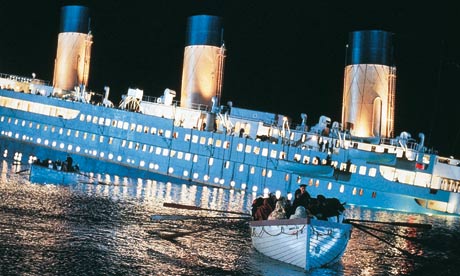
The sinking of the Titanic almost exactly 100 years ago, on 15 April 1912, has become, for literature and storytelling, the gift that goes on giving.
As early as May 1912, Thomas Hardy's poem The Convergence of the Twain captured the fatal and mesmerising conjunction of the iceberg and the liner. In 1931, Noël Coward's play, Cavalcade, featured a comic scene that reduces the tragedy to a brilliant theatrical joke. In 1996, Beryl Bainbridge's Every Man for Himself was shortlisted for the Booker.
More immediately, there was a huge public appetite for spine-tingling accounts of the disaster, from the scarcely perceptible moment of impact to the terrible screams of drowning men. Walter Lord's 1955 classic A Night to Remember, which also became a movie, has illuminated every subsequent Titanic book and film.
As harrowing as the disaster was the fate of the 705 survivors whose lives were scarred by the horrors of that night. Andrew Wilson, the equal of Walter Lord, reports this side of the story in Shadow of the Titanic (Simon & Schuster), a gripping account of the sinking's bitter aftermath.
Some, like Bruce Ismay, the managing director of the White Star Line, were doomed to become a whipping boy for the catastrophe. For others, such as Madeleine Force Astor, whose husband, JJ Astor, sacrificed himself to save his bride, life as a survivor became a danse macabre that ended in marriage to a brutal and penniless Italian prizefighter.
The Titanic story sponsors another circle of narrative hell: the truth, or otherwise, of what really happened once the ship went down. What, for instance, took place on lifeboat number one? In particular, what was the conduct of Cosmo and Lady Duff Gordon? The press had a field day with allegations of cowardice and corruption, including the bribing of the lifeboat's crew. When Lady Duff Gordon gave evidence to the Board of Trade investigation, her cross-examination exposed the fallibility of memory, the frailty of the individual in extremis and the psychological chasm between those who have, and those who have not, had to confront imminent oblivion. Plainly, hers was an existential predicament.
Perhaps only fiction can tackle the moral dilemmas braided into the survivor's tale. A compelling and disquieting first novel, The Lifeboat, by Charlotte Rogan (Virago), addresses this question with a rich, enthralling subtlety. Rogan's lifeboat is fictional, as is her disaster – the sinking of the Empress Alexandra in the summer of 1914 – but the inspiration for her irresistible first-person narrative is the Titanic.
Newly married Grace Winter and her husband are honeymooning on a transatlantic liner when it catches fire and sinks. Like JJ Astor, Henry Winter secures his new wife a single, life-saving seat on the last lifeboat. Grace Winter survives. But, at her subsequent trial for murder, we begin to discover – or do we? – the price the 22-year-old widow has paid for her escape.
The Lifeboat is also an escape route for its author. Charlotte Rogan, who graduated from Princeton in 1975, is a first-timer with her own exceptional story. Nurturing the ambition to be a novelist for many years, she once took a writing course with the late Harold Brodkey, another writer who devoted years to a magnum opus.
Brodkey was all posture. Rogan, who modestly says she has been teaching herself to write throughout her adult life, is a much more appealing figure. Like many women with literary ambitions, she put her family first and stayed at home in Dallas, raising triplets. A chance encounter with New York Times writer and fellow Texan Sara Mosle revealed that Rogan had a drawer full of unpublished fiction, including several novels, written over 30 years.
With some trepidation, Mosle agreed to advise Rogan about the promotion of her work to a New York publisher, was impressed by what she found and put her in touch with literary agent David McCormick, who proceeded to clinch an immediate sale for one of Rogan's novels, a book that Mosle had not even read. This was The Lifeboat, which has been acclaimed before publication by both JM Coetzee and Emma Donoghue. It looks set to become Charlotte Rogan's literary life raft.
All the world's a stage at the local bookshop
Among the many unintended consequences of the great British library crisis is the revival of the bookshop as a cultural community hub. This takes many forms. Some bookshops sell marmalade and poetry seminars. Others are beginning to pioneer unique cultural experiences. In Oxford, Blackwell's Broad Street bookshop, for instance, has just gone into partnership with the experimental players of the Factory Theatre Company and Creation Theatre to perform Hamlet (5-24 March) and a version of The Odyssey based on a new translation (29 March to 28 April). Oxford's book lovers have long been used to author events at Blackwell's. I hope they respond with the same enthusiasm to this invasion of itinerant thespians. As one Creation Theatre spokesperson puts it: "Our shows are beautiful, ugly, fast, furious, twisted, surprising, spooky, magical, daring, haunting, challenging, inspiring, hilarious, sexy, sassy, cheeky… but never predictable." Don't say you haven't been warned.
Locomotor! Platform 9¾ is on the move again
The north London building site also known as King's Cross station has left at least one juvenile class of traveller dazed and confused. Harry Potter's Platform 9¾, a bizarre pilgrimage site, has enjoyed several locations, most recently just outside the main concourse. Now it's been moved for a fourth time. More conscious of Pottermania than railway timetables, the authorities have installed a helpful sign. One solution to this problem might be to relocate this literary shrine 200 yards west – to the British Library.

